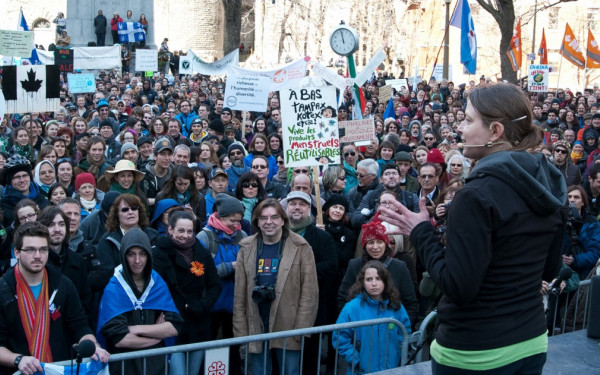Canadians Protest for Climate Awareness
Thousands Rally in Quebec City Ahead of Climate Summit
An estimated 25,000 marched for climate change action in Quebec City on Saturday in anticipation of an environmental summit between the Canadian premiers in the provincial capital this week.
Groups of students, labourers and families from all over Canada weaved through the city’s narrow streets to protest outside parliament, where they listened to speeches from politicians, organizers and First Nations citizens.
Holding red placards skyward, the crowd formed a thermometer shape around Fontaine de Tourny for an overhead photo.
At the summit starting on Tuesday, controversial projects like oil extraction from prairie tar sands and TransCanada’s Energy East Pipeline will be debated.
Spanning from Alberta to New Brunswick across 4600 kilometers and six provinces, the $12 billion refitted natural gas pipeline is expected to be completed in 2020. Some demonstrators built and carried a cardboard pipeline with a symbolic snake’s head attached to the end.
_800_1200_90.jpg)
Dennis Drainville, the Anglican Bishop of Quebec, wearing his biblical garb and holding a customized sign, said that mobilization is essential for change. As a former elected politician in Ontario, he said that although politicians may not listen to protesters, they will be difficult to ignore.
The government has an agenda that is driven by the petroleum industry, not its citizens, and that is a main issue with Canada’s political system, he argued. “Democracy is out the window and what we have is tyranny,” he said.
Drainville added that politicians who cry hypocrisy at activists who use gas and oil are missing the point. “The biggest hypocrites here are the ones who won’t consider the future,” he said. “They think there is no future, and they don’t give a damn.”
Estelle Richard, a member of Friends of the Earth Québec, a grassroots organization founded in the 1970s, said she hopes the march influences politicians to pay greater attention to the future of the planet, rather than the future of Canada’s economy.
“I’m from Quebec City, and I’ve never seen this,” she said about the crowd’s attendance and her optimism of its effect on policy change.
“I’m from Quebec City, and I’ve never seen this,” Estelle Richard said about the crowd’s attendance and her optimism of its effect on policy change.
She continued by saying that politicians are near-sighted during their mandated terms in office, only focusing on Canada’s fiscal future. For projects like the Energy East pipeline, however, Richard has hope.
“For the pipeline, I think we can win this battle,” she said.
Rahul Mehta and his friends from outside Toronto formed the Peel Environmental Youth Alliance back in high school. With many of the original founders now in different universities around Ontario, the group reunited for the march to continue PEYA’s mandate of combatting climate change.
Mehta said he was excited to see the diversity of participants at the march and that he is optimistic about the effects of the demonstration before Tuesday’s summit.
“I think [getting through to] the premiers is a smart way to get to the Prime Minister, who has not been listening recently,” Mehta said. “Localizing the movement has been the most successful way we’ve gotten as far we have.”

_900_600_90.jpg)
_900_600_90.jpg)
_900_600_90.jpg)
_900_600_90.jpg)
_900_600_90.jpg)




_600_375_90_s_c1.jpg)